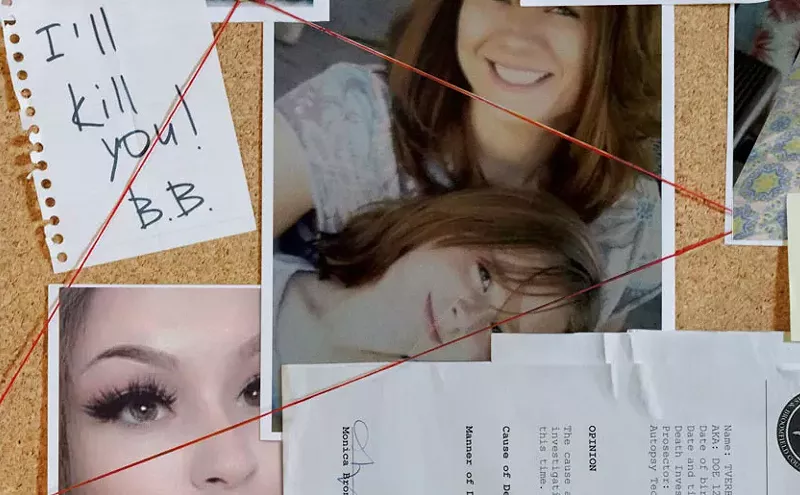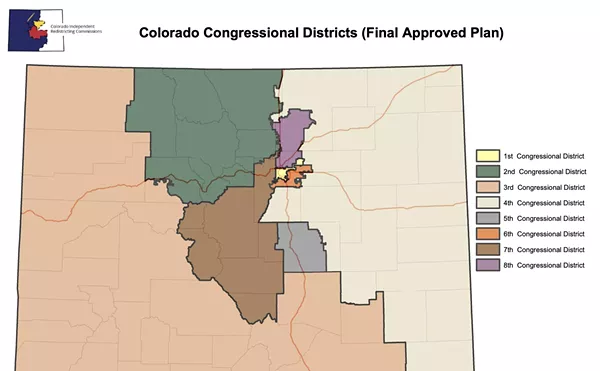The Colorado Supreme Court's Office of Attorney Regulation Counsel has found no grounds to impose disciplinary measures on former congressman Scott McInnis -- even though the fact he received $300,000 from a private foundation for plagiarized writings on water law was enough to knock him out of the governor's race last year.
Ethics Watch director Luis Toro had requested an OARC investigation to determine whether McInnis had violated attorney ethics standards by providing a series of articles on state water law to the Hasan Family Foundation at a cost of $2,000 per page and representing the work as his own. In addition to being execrably written, one section of the "Musings on Water" borrowed heavily and without credit from a 1984 essay by Colorado Supreme Court Justice Gregory Hobbs.
In a letter to Toro dated May 20, Regulation Counsel John Gleason concludes that there is no "clear and convincing evidence Mr. McInnis knowingly engaged in dishonest conduct" because the incorporation of Hobbs' work was done by his research assistant, Rollie Fisher, despite cautions from McInnis not to plagiarize. Furthermore, McInnis produced e-mails that indicated he'd told the Hasans that he'd retained Fisher to help him prepare the articles.
In certain quarters, Gleason's lawyerly analysis is being hailed as proof that McInnis got a raw deal from GOP leaders and the Denver Post over this embarrassing little flap. One supporter even sent out an e-mail claiming that McInnis had been "exonerated" and suggesting that the Denver media is deliberately ignoring this remarkable turn of events.
But getting a pass from the state's attorney regulators is hardly an exoneration -- unless, of course, you happen to believe that the Nixon pardon was an acquittal. As we've pointed out before, except in blatant cases of lawyers screwing clients (financially or sexually) -- or, God forbid, of someone giving legal advice without a license -- the OARC isn't known for zealous enforcement actions. Of the 5,000 complaints the agency receives each year, less than 10 percent are considered worthy of actual investigation, and only a small fraction of those cases lead to a public hearing.
In the McInnis case, Gleason has adopted the same line of reasoning that McInnis did when the story broke last year: it's all Fisher's fault. He didn't tell McInnis that he'd lifted Hobbs' work (which he apparently believed was in the public domain), so how can we hold McInnis responsible for the theft? And since the Hasans evidently knew McInnis had hired a research assistant -- contrary to statements made when the scandal erupted -- what's the big deal?
But this line of argument neatly sidesteps one huge honking piece of evidence in the case -- the memo McInnis sent to Seeme Hasan on December 2, 2005, in which he declared, "The articles have been carefully documented, proofed and again at your insistence, written at a level that non-water experts could easily understand... All the Articles are original and not reprinted from any other source."
Documented? Nope; the absence of footnotes is one of its few charms. Proofed, maybe, but it's hard to tell, given the weird quirks of grammar and punctuation that seem to pass for the congressman's style. But by putting his name at the top, McInnis was representing that the stuff was indeed original. Acknowledging the aid of a research assistant, or even a ghost writer (which the project badly needed) doesn't absolve the principal of the duty to insure that what's being warranted as original is, in fact, original. In authorship and politics, the buck stops at the big guy's desk.
Any high schooler knows that passing off somebody else's work as your own is unethical. But that's real-world ethics. Attorney ethics operate in a more elevated realm -- somewhere between here and the 63 moons of Jupiter.
More from our Media archive: "Scott McInnis, Rolly Fischer and the more dubious part of the Denver Post scoop."












